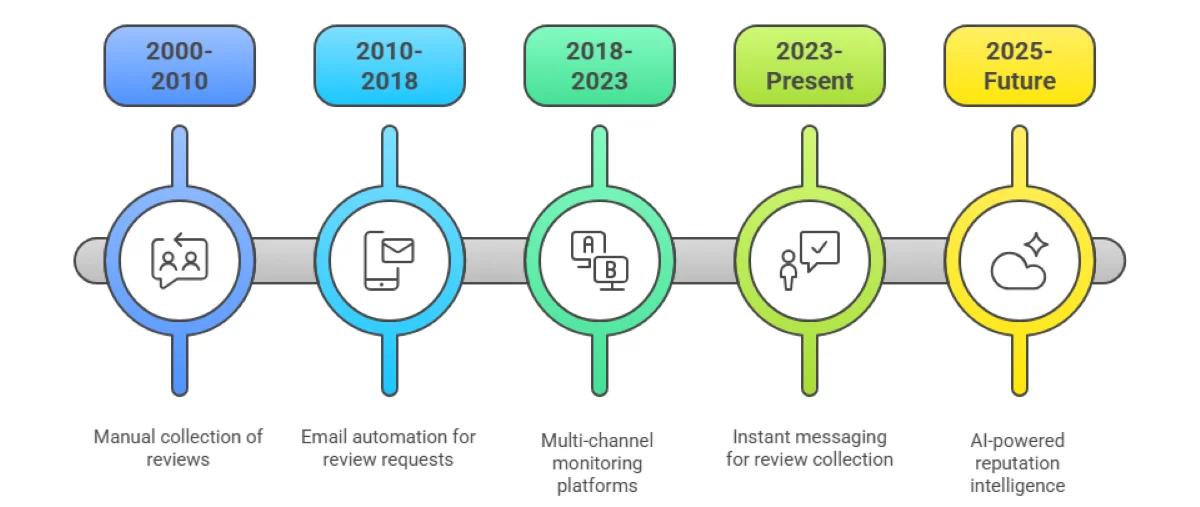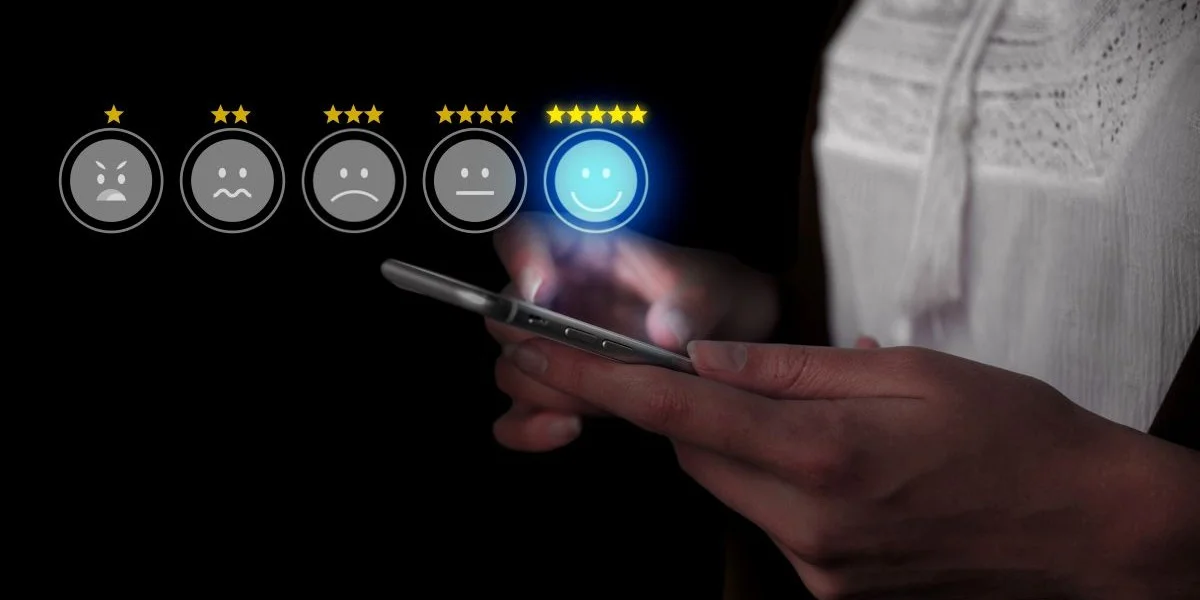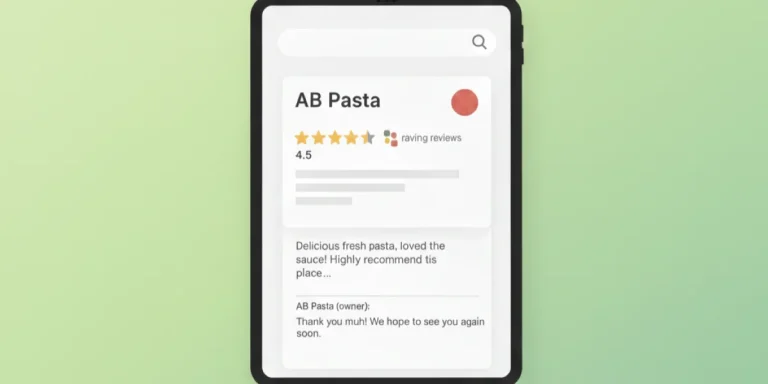
When was the last time you actually opened a review request email from a business? Probably never, right? Your customers aren’t opening them either, and that’s exactly why your inbox strategy stopped working somewhere around 2020. Most business owners are still playing the old game: send an email, cross your fingers, maybe get one review out of fifty attempts.
Meanwhile, there’s a quiet revolution happening on WhatsApp that’s completely flipping the script. Research found that AI chatbot traffic jumped 80.92% in just one year, which means that how people discover and judge your business has completely changed. If you’re still doing online reputation management the old way, waiting for reviews to trickle in or manually checking Google every few days, you’re essentially invisible to the billion people now using AI to research businesses before they buy.

What’s the future of online reputation management?

Reputation management is rapidly evolving beyond simple review monitoring into an AI-driven, predictive discipline where automation, real-time intelligence, and conversational platforms replace traditional reactive strategies with proactive brand protection and growth.
AI will predict and prevent reputation crises
Machine learning algorithms will analyze patterns in customer sentiment, social signals, and feedback trends to forecast potential reputation issues days or weeks before they surface publicly, enabling businesses to intervene proactively.
Voice and video reviews will dominate text
As younger consumers prefer authentic visual content, businesses will shift from text-based testimonials to video reviews collected through platforms like WhatsApp, TikTok, and Instagram, creating more engaging and trustworthy social proof.
Instant messaging replaces email entirely
WhatsApp, Telegram, and similar platforms will become the primary channels for reputation management, with email-based systems becoming obsolete as businesses demand the 98% engagement rates that instant messaging delivers consistently.
AI assistants will shape brand perception
With ChatGPT and similar AI tools answering billions of daily queries about businesses, reputation management will focus heavily on ensuring AI systems have access to accurate, positive, structured data about your brand.
Personalization at scale becomes standard
Every customer interaction, from review requests to response messages, will be hyper-personalized using AI that understands individual preferences, purchase history, and communication styles while maintaining an authentic human connection at scale.
Why traditional reputation management is failing in the AI era?
The reputation management playbook that worked five years ago has become obsolete as artificial intelligence reshapes how customers discover and evaluate businesses across every industry and platform.
Manual monitoring can’t keep up
Checking review sites once daily or weekly leaves dangerous gaps where negative feedback spreads unchecked. Customers expect responses within hours, not days, making manual monitoring ineffective for protecting brand reputation.
Email surveys are losing effectiveness
Email-based review requests now achieve only 20% open rates compared to WhatsApp’s 98%, making traditional survey methods increasingly inefficient. Customers simply ignore email requests that arrive days after their purchase experience.
Monitoring without generation
Existing ORM platforms excel at tracking mentions but fail to actively generate new positive reviews. This reactive approach leaves businesses dependent on sporadic, unpredictable customer feedback rather than consistent reputation building.
Pricing excludes small businesses
Traditional reputation management solutions cost $300-$2,000 monthly, pricing out the SMBs who need reputation tools most. This creates a competitive disadvantage for smaller businesses competing against better-funded rivals.
AI operates without oversight
Large language models like ChatGPT now answer 14 billion daily queries, often synthesizing business information without real-time accuracy. Traditional ORM tools weren’t designed to influence how AI systems represent your brand.
The evolution of online reputation management

Online reputation management has undergone three distinct phases, each driven by fundamental shifts in how customers communicate and how businesses collect feedback about their products and services.
Phase 1: Manual collection (2000-2010)
Businesses manually asked satisfied customers to post reviews on emerging platforms like Yelp and Google. This labor-intensive process yielded sporadic results and required dedicated staff time for every single review request.
Phase 2: Email automation (2010-2018)
Automated email systems enabled bulk review requests after purchase, dramatically scaling outreach capacity. However, declining email engagement rates and spam filters gradually diminished effectiveness, creating new challenges for reputation managers.
Phase 3: Multi-channel monitoring (2018-2023)
Comprehensive platforms emerged to track reviews across dozens of sites simultaneously. These tools provided visibility but remained reactive, alerting businesses to problems rather than proactively building a positive reputation through systematic review generation.
Phase 4: Instant messaging era (2023-Present)
WhatsApp and similar platforms introduced conversational review collection with 98% open rates. This shift restored the personal connection lost in email while maintaining automation’s scalability and efficiency benefits.
Phase 5: AI-powered intelligence (2025-Future)
Artificial intelligence now predicts which customers will leave positive reviews and crafts personalized responses instantly. This phase combines predictive analytics, sentiment analysis, and real-time adaptation for unprecedented reputation control.
Why WhatsApp is the future of review and reputation management?
WhatsApp has emerged as the most effective channel for review collection, combining the intimacy of personal messaging with the scale of automated systems to transform reputation management.
98% open rate advantage
WhatsApp messages achieve near-universal open rates because customers treat the platform as personal communication. This dramatic difference means review requests actually reach customers rather than languishing in cluttered inboxes or spam folders.
Real-time connection works better
Customers respond to WhatsApp messages within minutes rather than days, capturing feedback while experiences remain fresh. This immediacy increases both response rates and review quality, providing more detailed and emotionally authentic testimonials.
Conversational, not transactional
WhatsApp’s chat-based interface transforms review requests from formal surveys into friendly conversations. This human-like interaction reduces friction and increases willingness to provide detailed feedback about products, services, and overall experience.
Native media support
Customers can effortlessly share photos and videos through WhatsApp’s built-in media features. Visual testimonials prove more convincing than text alone, particularly for younger demographics who prefer video content over written reviews.
Seamless integration capabilities
WhatsApp Business API connects directly with existing business systems for automated workflows. This integration triggers review requests based on purchase events, delivery confirmations, or service completion without requiring manual intervention.
How are AI search engines like ChatGPT reshaping your online reputation?

Artificial intelligence systems have fundamentally altered how potential customers form first impressions, moving beyond traditional search engines to conversational platforms that synthesize and interpret your online presence.
1 billion users research through AI
OpenAI founder Sam Altman confirmed that approximately 1 billion people use ChatGPT, representing 10% of the global population. These users increasingly ask AI systems about businesses rather than scrolling through traditional search results.
Single authoritative answers
Unlike Google’s list of links, AI chatbots provide one synthesized response about your business. This concentrated narrative becomes the first and often only impression, making accuracy and positivity in AI responses critical for reputation.
Reviews train AI models
Large language models incorporate customer reviews into their training data and real-time search results. Consistent positive reviews directly influence how AI systems describe your business, products, services, and overall trustworthiness.
Wikipedia dominates AI training
Research reveals that Wikipedia serves as the second-most prominent LLM training source. Structured business information, reviews, and factual content help AI systems generate accurate, favorable descriptions of your brand.
Outdated information lingers
AI models may present outdated negative reviews or resolved issues as current facts. Without fresh, positive feedback continuously entering the ecosystem, AI systems perpetuate old problems, damaging their reputation despite actual improvements.
Why traditional ORM tools miss the mark for modern businesses
Legacy reputation management platforms were built for enterprise monitoring rather than active review generation, creating fundamental misalignment with what small and medium businesses actually need today.
Monitoring without generation
Traditional platforms excel at tracking mentions across multiple sites, but don’t help generate new positive reviews. This passive approach leaves businesses waiting for reviews rather than systematically collecting feedback from satisfied customers.
Enterprise pricing models
Monthly costs ranging from $300 to $2,000+ make traditional ORM software unaffordable for most small businesses. These pricing structures favor large corporations while leaving SMBs without effective reputation management tools.
Email-dependent systems
Most ORM platforms still rely on email for review requests despite proven ineffectiveness. The 20% open rate for email means 80% of review opportunities vanish, severely limiting reputation building potential.
Complex interfaces
Enterprise ORM tools feature overwhelming dashboards designed for full-time reputation managers. Small business owners need simple, intuitive interfaces they can use without extensive training or dedicated personnel.
Missing instant messaging integration
Traditional tools weren’t designed for WhatsApp, Telegram, or other instant messaging platforms where customers actually engage. This fundamental gap prevents businesses from leveraging the most effective communication channels.
How does WhatsApp automation transform your reputation strategy?
WhatsApp automation fundamentally changes reputation management from sporadic, manual outreach into a systematic, scalable process that consistently generates authentic customer feedback across all business touchpoints.
Automatic post-transaction requests
The system triggers personalized review requests immediately following purchases, deliveries, or service completion. This perfect timing captures customer satisfaction while experiences remain fresh, dramatically increasing response likelihood and review quality.
Personalized messaging at scale
Automation doesn’t mean generic communication messages like customer names, specific products purchased, and transaction dates. This personalization maintains the authentic connection that makes WhatsApp effective while operating at scale.
Intelligent follow-up sequences
If customers don’t respond initially, automated reminder sequences gently prompt feedback without being pushy. These strategic follow-ups can double or triple response rates compared to single-message approaches.
Multi-language support
WhatsApp automation handles multiple languages seamlessly, enabling businesses to collect reviews from diverse customer populations. This localization ensures messages feel natural and culturally appropriate regardless of geographic market.
Analytics and insights
Centralized dashboards track response rates, sentiment trends, and review distribution across platforms. These insights identify which products generate positive feedback and which customer segments engage most, informing broader business strategy.
How WhatsApp review automation boosts Google rankings and local SEO

Consistent review generation through WhatsApp automation directly impacts search visibility, creating a powerful flywheel effect where better rankings generate more customers who leave more reviews.
Fresh reviews signal activity
Google prioritizes businesses with recent review activity in local search rankings. Regular new reviews through WhatsApp automation continuously signal that your business actively serves customers, improving visibility.
Higher volume increases visibility
Businesses with more total reviews rank higher in Google’s Local 3-Pack. WhatsApp automation’s superior response rates help accumulate reviews faster than email-based methods, accelerating local SEO gains.
Star ratings drive clicks
Higher average ratings in search results directly increase click-through rates from search to your business profiles. Even small improvements from 4.2 to 4.7 stars significantly impact how many searchers choose your business.
Response rates affect ranking
Google considers how businesses respond to reviews when determining local rankings. WhatsApp automation enables faster, more consistent responses, demonstrating customer service commitment that algorithms reward with better positioning.
Keyword-rich review content
Customer reviews naturally include location names, product descriptions, and service keywords. This authentic user-generated content helps your business rank for long-tail search queries related to specific offerings and geographic areas.
Why choose Spreadical for WhatsApp reputation automation?
Spreadical gives you a complete set of tools to handle customer reviews from start to finish, whether you’re running a small shop or managing multiple locations across different cities.
Get more Google reviews on autopilot
Our Google Review Booster reaches out to your happy customers through WhatsApp and guides them to leave you those valuable 5-star reviews. It’s like having a team member dedicated to building your online presence, except it works 24/7 without taking breaks.
Know instantly when customers review
Every time someone posts a new Google review about your business, you’ll get it sent straight to your WhatsApp. No more logging into different platforms or missing important feedback; everything comes to you in real-time.
AI write your review responses
Our smart AI looks at each review and creates a response that sounds like you. It matches your brand’s personality and addresses exactly what the customer said. You can use it as-is or tweak it before sending.
The system gets smarter with every response
Here’s the cool part: Spreadical pays attention to how you edit responses and what you approve. Over time, it learns your style and preferences, making each suggested reply more accurate and personalized to your business voice.
Manage everything without leaving WhatsApp
You can read reviews, approve AI responses, make edits, or publish replies, all from WhatsApp. No switching between apps or dashboards. Your reputation management happens right where you’re already chatting with customers.
One dashboard for all your Google reviews
Instead of juggling multiple tabs and platforms, Spreadical brings all your Google reviews into one clean, organized system. Everything you need is in one place, making management simple and stress-free.
Frequently asked questions
What is WhatsApp reputation management?
WhatsApp reputation management uses automated messaging through WhatsApp Business to systematically collect, monitor, and respond to customer reviews. This approach leverages WhatsApp’s 98% open rate to generate consistent feedback that builds online reputation across Google, social media, and AI platforms.
How does WhatsApp automation help businesses improve reviews?
WhatsApp automation sends personalized review requests at optimal moments after purchases or service completion, achieving response rates 3-5x higher than email. The conversational format feels natural to customers, increasing their willingness to share detailed, positive feedback.
Why is WhatsApp better than email for collecting feedback?
WhatsApp achieves 98% open rates compared to email’s 20%, ensuring review requests actually reach customers. The instant messaging format feels personal rather than promotional, and customers typically respond within minutes instead of days or not at all.
How can Spreadical automate customer review requests?
Spreadical integrates with your CRM or eCommerce system to automatically trigger personalized WhatsApp messages after transactions. The system includes customer names, purchase details, and intelligent follow-up sequences while routing positive responses to public review platforms.
Is Spreadical secure and compliant?
Yes, Spreadical operates in full compliance with WhatsApp Business policies, GDPR, and data protection regulations. All customer communications are encrypted end-to-end, and consent management features ensure compliance with review collection guidelines and privacy laws.
What are the SEO benefits of automated review collection?
Automated review generation provides continuous fresh content that signals business activity to Google, improves local search rankings, and increases click-through rates. More reviews with positive ratings directly correlate with better visibility in Google’s Local 3-Pack.
How does WhatsApp automation improve local business reputation?
Local businesses gain consistent positive reviews that dominate search results, respond faster to customer feedback, and build trust through authentic testimonials. The system ensures satisfied customers become vocal advocates across Google, Facebook, and other local platforms.
Can Spreadical integrate with CRMs or eCommerce platforms?
Spreadical integrates seamlessly with popular CRM systems, eCommerce platforms, and point-of-sale solutions through API connections. These integrations enable automatic review request triggers based on purchase events, appointments, deliveries, or custom business workflows.
What types of businesses should use WhatsApp automation tools?
Any customer-facing business benefits from WhatsApp review automation, including restaurants, retail stores, professional services, healthcare providers, home services, eCommerce brands, and hospitality businesses. The system scales from single-location operations to multi-location enterprises.
How do I start using Spreadical for online reputation management?
Begin by connecting your WhatsApp Business account and integrating your existing CRM or eCommerce system. Spreadical’s onboarding process includes message template setup, automation workflow configuration, and team training to launch your reputation management program within days.


